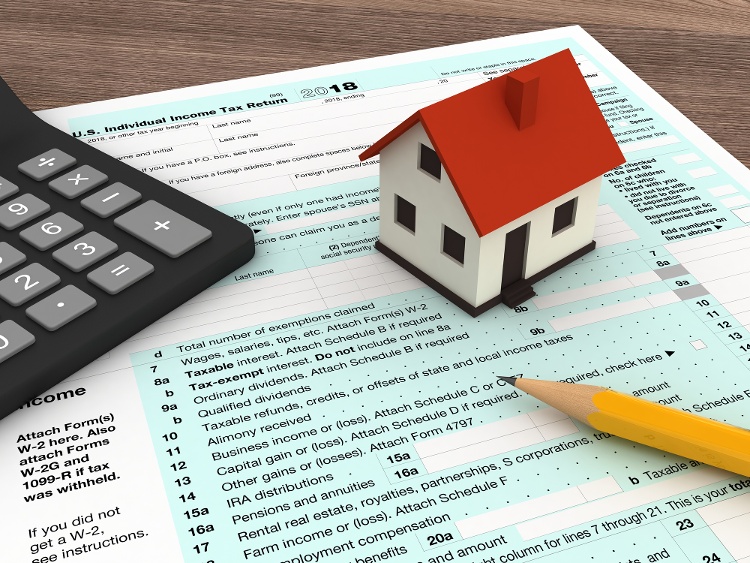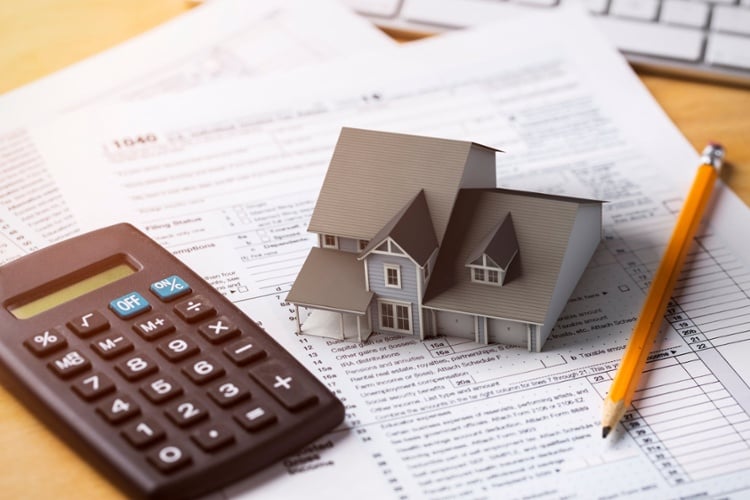Tax deductions are one of the many reasons why people invest in real estate. Believe it or not, tax law is extremely friendly to real estate investors.
In this article we’ll talk about closing costs you can deduct right away, how increasing your basis can help reduce taxable net income, and how to defer paying capital gains taxes when the time comes to sell your rental property.
Disclaimer: This is not tax advice. You should consult your own tax, legal, and accounting advisors before engaging in any transaction.
How to account for closing costs
Closings costs on a rental property fall into one of three categories:
- Deduct upfront in the current year
- Amortize over the loan term
- Add to basis (capitalize) and depreciate over 27.5 years
To learn more about the specific tax rules about how to account for closing costs, you can reference IRS Publication 551 from 2022, Basis of Assets.

Three upfront tax deductible closing costs
There are three closing costs on rental property that can be deducted right away:
1. Mortgage interestThe interest part of the mortgage payment can be deducted as a closing cost, but not the principal payment because that is an offset to the loan liability on your balance sheet.
For example, if your mortgage is $481 per month principal and interest, only the interest portion of the payment ($292.50) is tax deductible. Other mortgage-related costs such as mortgage broker commission and recording fees are added to the basis.
2. Mortgage pointsAlso known as discount points, mortgage points are fees paid to the lender in exchange for buying down the rate or reducing the interest rate. One point costs 1% of your mortgage, so one point on a $112,500 mortgage would be $1,125. Points also typically include expenses such as credit check fees and paperwork preparation.
Generally speaking, you will spread the deduction for points over the period of the loan rather than deducting this expense in the first year. But, always check with your tax professional for guidance, because every investor’s situation is different.
3. Real estate property taxesProperty taxes paid at closing can also be deducted as a rental tax expense. Real estate taxes are prorated between the buyer and seller, with the day of closing belonging to the buyer.
For example, let’s assume you close escrow on March 15th and the seller has already paid the first half-year of real estate taxes in the amount of $950. There are 181 days between January 1st and June 30th, with 73 days belonging to the seller and 108 days belonging to the buyer.
The daily cost of real estate taxes is $5.25 ($950 / 181 days = $5.25 rounded with February having 28 days). Because the seller paid the real estate taxes for the time you own the property, the seller receives a credit of $567 on the settlement statement and you as the buyer receive a debit (or charge) of $567 for the first half-year of real estate (108 days x $5.25) as a tax-deductible closing cost.
What closing costs are added to basis?
Basis in a rental property is the price that you paid for the home. For example, if you purchased a single-family rental for $140,000 on a subdivided lot with a value of $10,000 your initial basis would be:
- Home value = $140,000
- Lot value = $10,000
- Initial basis = $150,000
Of course, it costs more to buy a rental property than just the price of the home and the lot. Extra expenses and closing costs that can be added to the basis include:
- Real estate commission if paid by the buyer, such as a buyer-broker fee.
- Inspection fees and surveys.
- Legal fees paid for preparing the purchase contract and deed.
- Title fees such as abstract, title search, and recording fees.
- Owner’s title insurance and transfer taxes, which is a tax paid to the state or local government where the real property is located.
- Real estate taxes that the seller owed but the buyer paid for, a situation sometimes found when buying distressed property that the seller can not afford to own.
- Existing mortgage assumed by the buyer, as when a property is purchased “subject to” the existing loan.
- Other debt owed by the seller that is paid by the buyer, such as money owed to a contractor for previous work done on the property or unpaid property management fees.
After adding these additional closing costs to your initial basis, you now have an increased “adjusted basis.”
Although it would be nice to expense 100% of the costs of buying a rental property right up front, that’s something the IRS simply doesn’t allow. However, just because you can’t deduct them right away does not mean the expenses go to waste.
Adding costs to your initial basis provides a couple of big benefits:
1. Increase depreciation expenseDepreciation is a non-cash expense that can be used to reduce taxable net income. The IRS assumes that residential rental property depreciates – or wears out – by the same amount over a period of 27.5 years. That means that as a real estate investor you can deduct 3.636% of your adjusted basis each year for 27.5 years.
For example, let’s assume the closing costs added to your initial basis equaled 2.5% of the property purchase price. On a $150,000 single-family rental home you would add $3,750 to the initial basis, giving you an adjusted basis of $143,750. Note that the lot value of $10,000 is not included in the adjusted basis for depreciation purposes, because land generally never wears out.
After separating the lot value from the building value you can calculate our annual non-cash depreciation expense used to reduce taxable net income:
- $143,750 x 3.636% = $5,227 per year (rounded)
So, if the net income on the rental property was $6,000 for the year, the net income subject to tax would be: $6,000 net income - $5,227 depreciation expense = $773.
If you were in the 24% tax bracket the depreciation expense on your single-family rental property could save you about $1,254 in federal income tax alone, excluding any state or local taxes.
2. Lower taxable net gainIncreasing your initial basis when you buy a rental property also provides benefits when the time comes to sell by lowering the taxable gain. Let’s say that after three years you sold the rental property for $164,000. The taxable gain would be $20,250 versus $24,000 had you not increased the cost basis of your rental property.
Can you deduct closing costs when selling a rental property?
In addition to deducting closing costs when you buy the property, there are also closing costs you can deduct when you sell a rental property:
1. Reduce selling price by closing costs paidSellers can deduct closing costs such as real estate commissions, legal fees, transfer taxes, title policy fees, and deed recording fees to lower the profit and lower the potential taxes owed.
Assuming seller closing costs run 8% of the sales price (including the real estate commission), deductible closing costs on the rental property sold for $164,000 would be $13,120, leaving you with a net sales price of $150,880.
2. Recapture depreciationRecall that the annual depreciation deduction on the rental property was $5,218 per year.
Over the three years you owned the property you used a total depreciation deduction of $15,654 to reduce taxable net income. The depreciation deduction also lowered the property cost basis to $128,096, which is the original cost basis of $143,750 less the total depreciation expense of $15,654.
When the rental property is sold, you have to recapture the depreciation and pay a depreciation recapture tax based on your ordinary income tax rate, capped at 25%. Assuming you are in the 24% tax bracket, your depreciation recapture tax due would be $15,654 x 24% = $3,757 (rounded).
3. Capital gains tax
Although your rental property sold for $164,000 you were able to reduce the net sales price to $150,880 by deducting closing costs. This makes the total gain on the sale $22,784, which is the net sales price of $150,880 less the cost basis after depreciation of $128,096.
However, you’ve already paid a depreciation recapture tax on $15,654 of the total gain, leaving you with a capital gain of $7,130 subject to a tax of 0%, 15%, or 20% depending on your income tax bracket. Assuming, for example, you fall in the middle capital gains bracket, your tax on the capital gain would be $1,070 (rounded) plus the recapture tax of $3,757 for a total tax due of $4,827.
4. Defer capital gains tax with a 1031 exchangeInstead of paying $4,827 in tax on the depreciation recapture and tax on the remaining capital gain, many real estate investors use a 1031 exchange to defer paying capital gains tax and the depreciation recapture tax. You can do this when you sell or relinquish one investment property and buy another like-kind replacement property.
There are three general rules to follow when conducting a 1031 tax-deferred exchange:
- Replacement must be a like-kind property used for business or investment purposes.
- Identify replacement property within 45 days of selling the relinquished property.
- Close on the replacement property within 180 days of selling the relinquished property.
The easiest way to stay organized for tax time
Navigating deductions and tax rules can be tricky, but staying on top of your property finances doesn’t have to be. Take your rental property management to the next level with the Stessa platform.
Stessa, trusted by over 250,000 landlords, helps streamline the record-keeping process so you can stay organized, maximize your tax deductions, and make informed decisions.
You also get features that make the day-to-day management of your properties easier, including:
- Automated income and expense tracking: Instantly sort and classify transactions from linked bank, lender, credit card, and property management accounts, all without additional fees or required add-ons.
- Financial reporting: Generate income statements, net cash flow summaries, and balance sheets (available with the paid Pro plan), among other reports.
- Landlord banking: Open an FDIC-insured high-yield bank account* for each property and easily integrate them with Stessa’s financial tracking features.
- Rental applications and tenant screening: Use Stessa’s tenant screening services and free rental applications to find and select qualified tenants.
- eSigning (in partnership with DocuSign): Upload your document, tag it for digital signatures, and send it to tenants, vendors, partners, and others.
- Free rent collection: Collect rent from tenants through one-time or recurring ACH payments.
- Real-time performance metrics: Get round-the-clock insights into the performance of your property portfolio.
- Property management integration: Link your property management data portal to Stessa to import transactions and get a detailed portfolio overview.
- Unlimited properties: Add an unlimited number of properties to your Stessa account.
- Collaborative access: Invite other investors, CPAs, spouses, and others to share your Stessa account. Manage their access levels to view and/or edit the account.
- Tax resources: Access the yearly Tax Guide and a suite of educational materials created in partnership with The Real Estate CPA to make tax season a breeze.
Experience a more efficient, stress-free way to manage your rental properties. Sign up for a free account with Stessa today.









